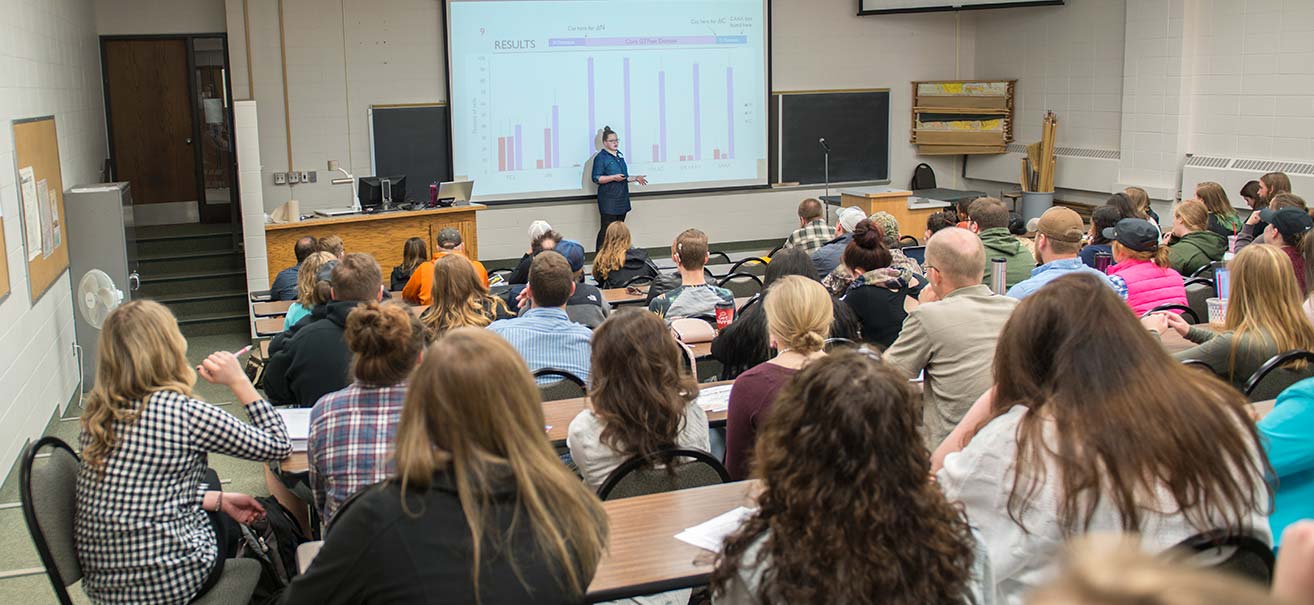
Hundreds of students representing the breadth of graduate and undergraduate disciplines at Bemidji State University shared their work during the 18th Annual Student Achievement Conference on April 5.
 The conference introduced several new elements and succeeded in its goal of increasing participation, which was up by nearly 25 percent over last year.
The conference introduced several new elements and succeeded in its goal of increasing participation, which was up by nearly 25 percent over last year.
One side of Memorial Hall, home for the conference’s poster presentations, featured exhibitions from art and music students, including a performance from five members of the BSU Jazz Band. This year’s conference also debuted an “elevator speech” competition in which students had one minute to recap their presentations. The top three finishers won BSU Bookstore gift cards.
Presentations included a Rubik’s Cube-solving robot, outreach by the President’s Student Commission to encourage college aspirations among youngsters at the Bemidji Boys & Girls Club, a plan for a three-semester college jazz curriculum and an examination of how the Dawes Act of 1887 affected life on American Indian reservations in the early 20th century.
A total of 281 students participated in the conference — 144 in oral presentations in Hagg-Sauer Hall, 151 in poster presentations, 23 in art and music exhibits and five in the jazz ensemble.
“The art and music exhibitions were amazing,” said Dr. Mahmoud Al-Odeh, associate professor of technology, art and design and coordinator of this year’s conference. “It was a great addition to the conference and reflected the talents that we have here at BSU.”
Motivational speaker Orna Drawas delivered the conference’s keynote address, encouraging her audience to make small changes in their lives on the path to unleashing their inner rock star.
Lacrosse enthusiast Melanie Childrey, a 2017 graduate in indigenous native nations from Minneapolis, shared the challenges faced by American Indians who wish to travel to lacrosse tournaments outside the United States.
Childrey focused on the Haudenosaunee — also known as Iroquois — and the passports issued by the Haudenosaunee Confederacy for international travel. Many North American ports of call reject the passports as invalid or “fantasy” passports, which creates difficulties when the confederacy’s residents attempt to travel across the U.S./Canadian border to participate in tournaments.
“There isn’t an understanding of the difference between tribal identification cards and passports issued to Haudenosaunee people,” she said.
Childrey said she appreciated the opportunity to share a topic she’s passionate about and discuss little-known tribal sovereignty issues related to lacrosse. She also sought to highlight the game’s roots in native culture.
“I wanted to bring lacrosse to a different type of audience and bring the game back to its Haudenosaunee roots,” she said. “Too many people only know the misinterpreted version of lacrosse found in rich white communities.”
Winston Churchill famously said, “The best argument against democracy is a five-minute conversation with the average voter.”
Kyle Priest, a 2017 graduate in political science from Columbus, Ohio, used Churchill’s statement to explore relationships between political knowledge and media consumption.
“The 2016 election brought out a lot of ‘fake news’ sites and allegations that certain channels were not truthful,” Priest said. “I decided to focus on those who are not informed and why they are not informed.”
His research explored the impact of media consumption on whether people were uninformed about current events, meaning they did not know about current events, or misinformed, meaning they thought they knew but had incorrect information.
Despite having two years of experience doing on-air commentary for Beaver hockey and basketball games, he said presenting at the conference provided a unique challenge.
“It helped me practice talking in front of people and giving a presentation that has a time limit,” Priest said. “I was comfortable talking to a mic, but giving a presentation to a real audience is a different beast.”
Brooke Tader, a 2017 graduate in biology and chemistry, had a full house when she gave her Student Achievement Conference presentation in Hagg-Sauer Hall.
“I had never done that in front of a large audience,” she said. “It was a great experience.”
Tader shared research she did with Dr. Michael Hamann, professor of biology, on a protein called TCL that has been found to be related to size and growth of cancerous tumors.
She is preparing to begin work on her master’s degree in biology and took part in the BSU conference to gain experience in making a scholarly presentation.
“Student Achievement Day was good preparation for my honor’s thesis defense, which was the following week, and good preparation for presenting my research at the national Experimental Biology conference in Chicago,” Tader said.
Will Varela, who plans to graduate in December with a degree in aquatic biology, used previous experience with a failed research topic to guide his presentation on brook trout habitats.
Originally, Varela’s senior capstone research project involved bluegill, a species of sunfish, but that topic proved too broad and unapproachable.
“When asking a research question, there are a lot of logistics to be worked out,” he said. “Some of these logistics can be feasible, and some cannot. So having a narrow topic is important and determines how successfully one can complete research — and this took me a couple of months to figure out.”
Varela presented research he completed last fall at brook trout spawning locations in the Necktie River, near Grace and Midge lakes southeast of Bemidji. He identified spawning areas on the river and analyzed why trout selected those locations.
Sharing his findings with an audience increased both his confidence and his ability to communicate clearly, Varela said.
“You’re not only disseminating your findings,” he said, “but also putting your findings into words the general public can understand without confusing them.”





